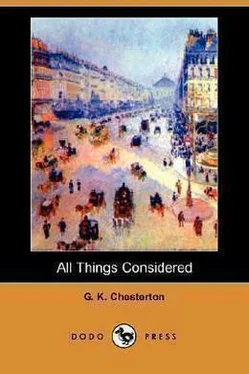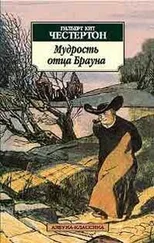At least, let us hope that we shall all live to see these absurd books about Success covered with a proper derision and neglect. They do not teach people to be successful, but they do teach people to be snobbish; they do spread a sort of evil poetry of worldliness. The Puritans are always denouncing books that inflame lust; what shall we say of books that inflame the viler passions of avarice and pride? A hundred years ago we had the ideal of the Industrious Apprentice; boys were told that by thrift and work they would all become Lord Mayors. This was fallacious, but it was manly, and had a minimum of moral truth. In our society, temperance will not help a poor man to enrich himself, but it may help him to respect himself. Good work will not make him a rich man, but good work may make him a good workman. The Industrious Apprentice rose by virtues few and narrow indeed, but still virtues. But what shall we say of the gospel preached to the new Industrious Apprentice; the Apprentice who rises not by his virtues, but avowedly by his vices?
On Running After One's Hat
I feel an almost savage envy on hearing that London has been flooded in my absence, while I am in the mere country. My own Battersea has been, I understand, particularly favoured as a meeting of the waters. Battersea was already, as I need hardly say, the most beautiful of human localities. Now that it has the additional splendour of great sheets of water, there must be something quite incomparable in the landscape (or waterscape) of my own romantic town. Battersea must be a vision of Venice. The boat that brought the meat from the butcher's must have shot along those lanes of rippling silver with the strange smoothness of the gondola. The greengrocer who brought cabbages to the corner of the Latchmere Road must have leant upon the oar with the unearthly grace of the gondolier. There is nothing so perfectly poetical as an island; and when a district is flooded it becomes an archipelago.
Some consider such romantic views of flood or fire slightly lacking in reality. But really this romantic view of such inconveniences is quite as practical as the other. The true optimist who sees in such things an opportunity for enjoyment is quite as logical and much more sensible than the ordinary "Indignant Ratepayer" who sees in them an opportunity for grumbling. Real pain, as in the case of being burnt at Smithfield or having a toothache, is a positive thing; it can be supported, but scarcely enjoyed. But, after all, our toothaches are the exception, and as for being burnt at Smithfield, it only happens to us at the very longest intervals. And most of the inconveniences that make men swear or women cry are really sentimental or imaginative inconveniences—things altogether of the mind. For instance, we often hear grown–up people complaining of having to hang about a railway station and wait for a train. Did you ever hear a small boy complain of having to hang about a railway station and wait for a train? No; for to him to be inside a railway station is to be inside a cavern of wonder and a palace of poetical pleasures. Because to him the red light and the green light on the signal are like a new sun and a new moon. Because to him when the wooden arm of the signal falls down suddenly, it is as if a great king had thrown down his staff as a signal and started a shrieking tournament of trains. I myself am of little boys' habit in this matter. They also serve who only stand and wait for the two fifteen. Their meditations may be full of rich and fruitful things. Many of the most purple hours of my life have been passed at Clapham Junction, which is now, I suppose, under water. I have been there in many moods so fixed and mystical that the water might well have come up to my waist before I noticed it particularly. But in the case of all such annoyances, as I have said, everything depends upon the emotional point of view. You can safely apply the test to almost every one of the things that are currently talked of as the typical nuisance of daily life.
For instance, there is a current impression that it is unpleasant to have to run after one's hat. Why should it be unpleasant to the well–ordered and pious mind? Not merely because it is running, and running exhausts one. The same people run much faster in games and sports. The same people run much more eagerly after an uninteresting; little leather ball than they will after a nice silk hat. There is an idea that it is humiliating to run after one's hat; and when people say it is humiliating they mean that it is comic. It certainly is comic; but man is a very comic creature, and most of the things he does are comic—eating, for instance. And the most comic things of all are exactly the things that are most worth doing—such as making love. A man running after a hat is not half so ridiculous as a man running after a wife.
Now a man could, if he felt rightly in the matter, run after his hat with the manliest ardour and the most sacred joy. He might regard himself as a jolly huntsman pursuing a wild animal, for certainly no animal could be wilder. In fact, I am inclined to believe that hat–hunting on windy days will be the sport of the upper classes in the future. There will be a meet of ladies and gentlemen on some high ground on a gusty morning. They will be told that the professional attendants have started a hat in such–and–such a thicket, or whatever be the technical term. Notice that this employment will in the fullest degree combine sport with humanitarianism. The hunters would feel that they were not inflicting pain. Nay, they would feel that they were inflicting pleasure, rich, almost riotous pleasure, upon the people who were looking on. When last I saw an old gentleman running after his hat in Hyde Park, I told him that a heart so benevolent as his ought to be filled with peace and thanks at the thought of how much unaffected pleasure his every gesture and bodily attitude were at that moment giving to the crowd.
The same principle can be applied to every other typical domestic worry. A gentleman trying to get a fly out of the milk or a piece of cork out of his glass of wine often imagines himself to be irritated. Let him think for a moment of the patience of anglers sitting by dark pools, and let his soul be immediately irradiated with gratification and repose. Again, I have known some people of very modern views driven by their distress to the use of theological terms to which they attached no doctrinal significance, merely because a drawer was jammed tight and they could not pull it out. A friend of mine was particularly afflicted in this way. Every day his drawer was jammed, and every day in consequence it was something else that rhymes to it. But I pointed out to him that this sense of wrong was really subjective and relative; it rested entirely upon the assumption that the drawer could, should, and would come out easily. "But if," I said, "you picture to yourself that you are pulling against some powerful and oppressive enemy, the struggle will become merely exciting and not exasperating. Imagine that you are tugging up a lifeboat out of the sea. Imagine that you are roping up a fellow–creature out of an Alpine crevass. Imagine even that you are a boy again and engaged in a tug–of–war between French and English." Shortly after saying this I left him; but I have no doubt at all that my words bore the best possible fruit. I have no doubt that every day of his life he hangs on to the handle of that drawer with a flushed face and eyes bright with battle, uttering encouraging shouts to himself, and seeming to hear all round him the roar of an applauding ring.
So I do not think that it is altogether fanciful or incredible to suppose that even the floods in London may be accepted and enjoyed poetically. Nothing beyond inconvenience seems really to have been caused by them; and inconvenience, as I have said, is only one aspect, and that the most unimaginative and accidental aspect of a really romantic situation. An adventure is only an inconvenience rightly considered. An inconvenience is only an adventure wrongly considered. The water that girdled the houses and shops of London must, if anything, have only increased their previous witchery and wonder. For as the Roman Catholic priest in the story said: "Wine is good with everything except water," and on a similar principle, water is good with everything except wine.
Читать дальше








